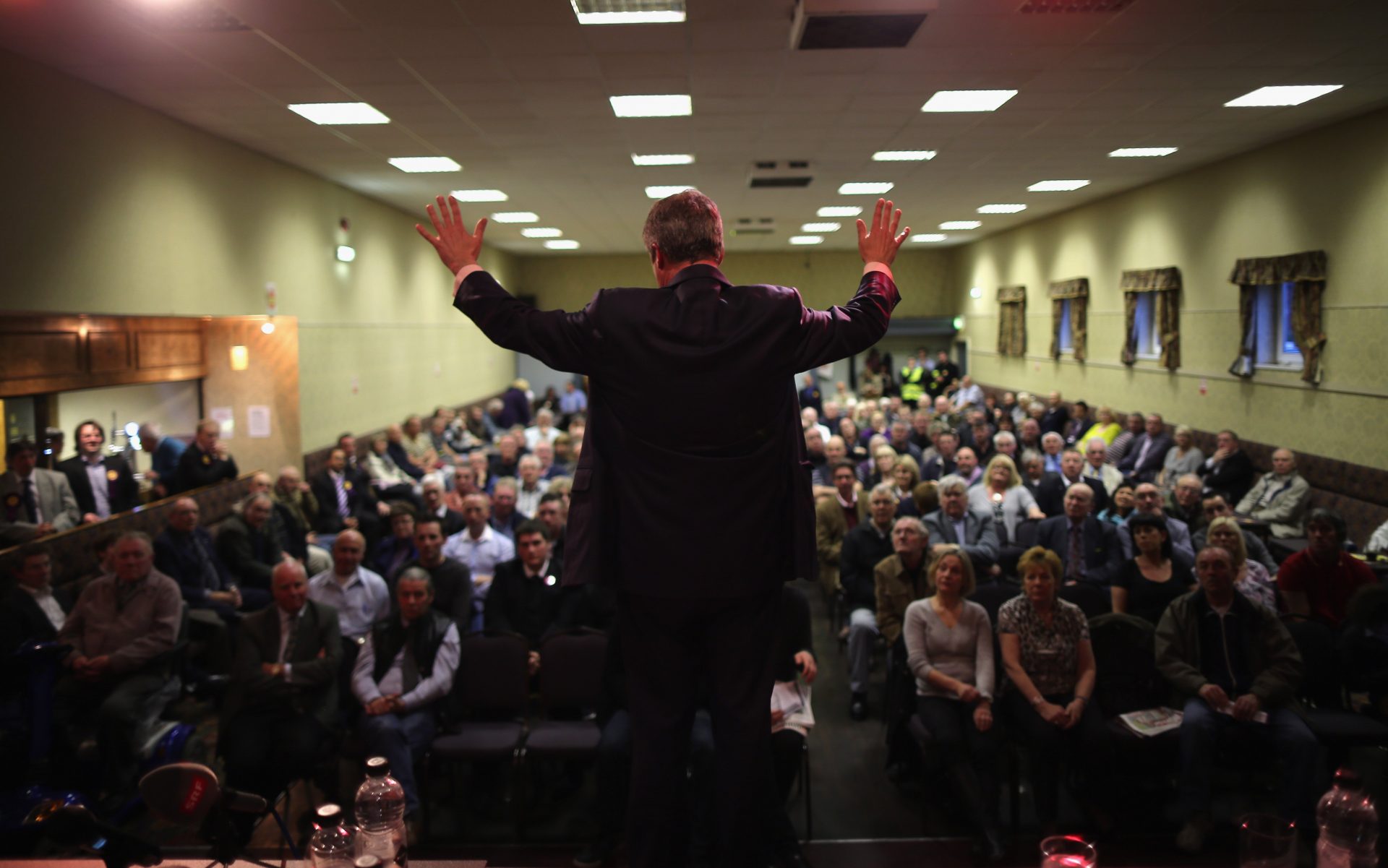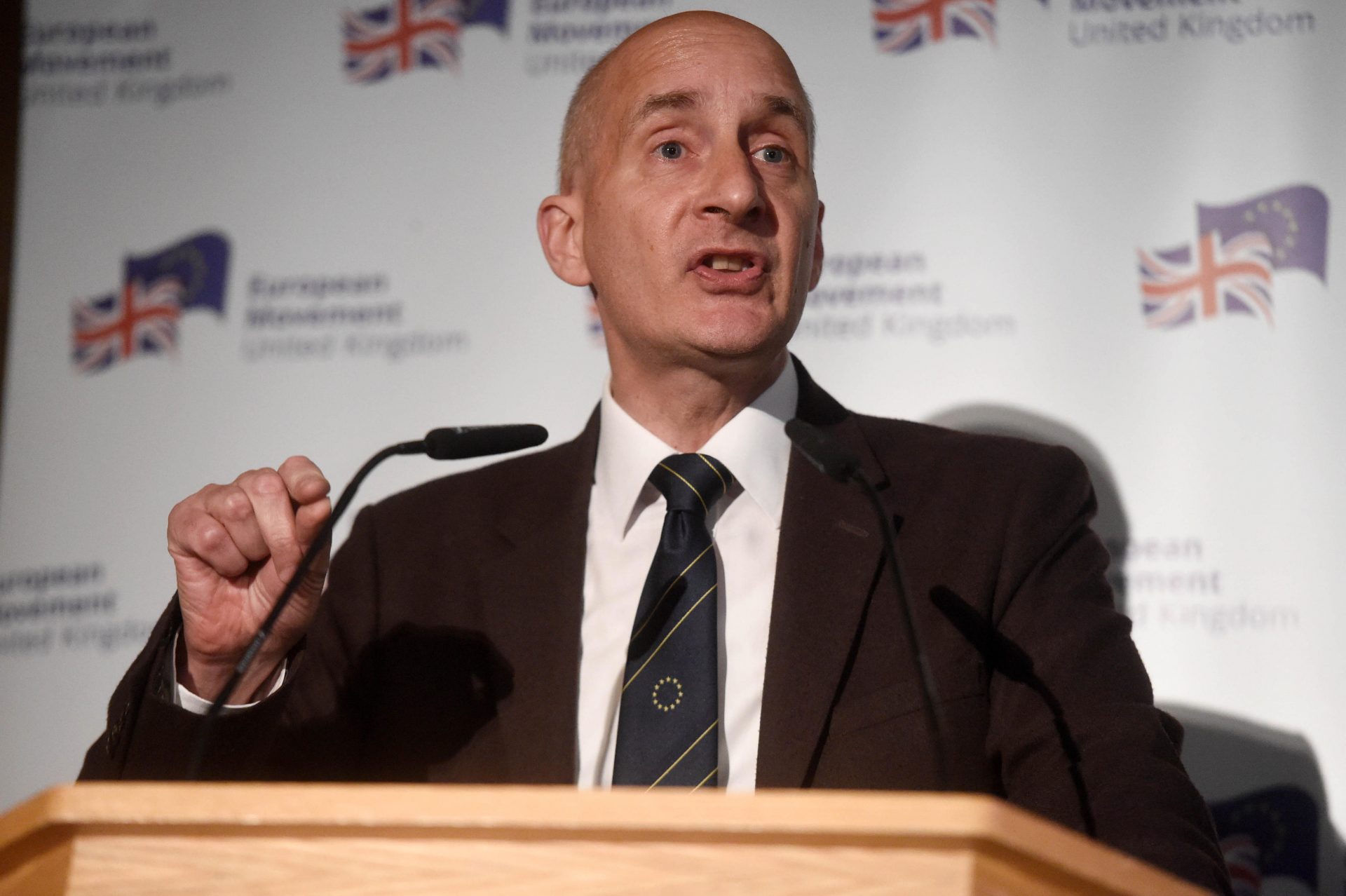Like Enoch Powell, Nigel Farage was a professional, elitist demagogue years in the making.
The origins of UKIP lie in the fringe organisations that sprouted after Thatcher’s Bruges speech of September 1988. The words “We have not rolled back the frontiers of the state in Britain only to see them reimposed at a European level with a super-state exercising a new dominance from Brussels,” set an anti-European blaze alight across right wing politics.
Shortly before the 1992 election, Alan Sked, a London School of Economics professor, left the Bruges Group, which he considered too loyal to John Major’s Conservatives, to launch the Anti-Federalist League (AFL). That year, Sked won just 117 votes in Bath. A year later the AFL founded UKIP. The founding meeting largely comprised anti-European academics, with one notable addition: Nigel Farage.
Farage grew up in awe of Thatcher. He joined the Tories in 1978. A brash, public school semirebel – “a wind-up merchant”, “bloody-minded” and “difficult”, according to his school reports – Farage planned to coin it in the City without bothering with university. Heading to a City metal trading floor in 1982, Thatcherism became his philosophy of life.
Farage got active in the Bruges Group in the late 1980s, and through it UKIP. “You’ve hit on the right word – nation,” he declared in his first election campaign in 1994. “We are the only party trying to stop all you fight for being thrown out of the window. We are witnessing a case of national suicide.” He took Thatcher’s line on John Major: weak and useless. Euroscepticism was the reclamation of Thatcherism.
“The more I read about the history of the Tory party, you realise that Thatcher wasn’t a Conservative at all, she was a radical economic liberal,” Farage told one interviewer. Asked if that was what he was, he replied, “Absolutely.” He added: “If you look at TV footage of Mrs Thatcher being interviewed in the Eighties it actually takes your breath away. She had conviction, passion, belief. She was forthright. She spoke in a language that ordinary people could understand. I was never a Tory. I am a Thatcherite.”
In 1994, aged 30, the same age as Tony Blair when first elected to parliament, Farage stood for UKIP in the Eastleigh by-election in Hampshire. He polled just 952 votes, on the same day as nationwide European Parliament elections in which UKIP won just one per cent.
UKIP vied for fringe attention with the billionaire financier Sir James Goldsmith and his Referendum Party, set up in the same year, whose sole objective was an in/out EU referendum. Goldsmith had everything UKIP did not: money, connections, and name recognition for its leader. But Farage soon developed an instinct for campaigning and the limelight. In the 1997 election, he notched up 3,332 votes in Salisbury. He was rising to the top of the UKIP pack. On its own that didn’t mean much, but then he had two strokes of luck.
Two months after Tony Blair’s landslide, Goldsmith died. His Referendum Party disintegrated and UKIP became the sole Euro protest party. His second, equally vital and lucky break was Blair’s decision to change the electoral system for the 1999 Euro elections from first-pastthe-post to PR. By now well-funded by ex-Tory donors, UKIP fielded candidates in all 11 constituencies for the 1999 Euro elections. It was first mid-term blues for New Labour. The Tories came first; UKIP was fourth with 6.5 per cent, but under the regional list PR system that was enough to elect three UKIP MEPs, one of them Nigel Farage.
And so began his 19 years’ membership of “A parliament I want no part of, under a system I despise, blinking into the cameras at one in the morning saying how proud I was,” he recalled.
Equipped with a platform, a European Parliament salary, staff and generous allowances, and adoring Brexit sugar daddies such as Paul Sykes and later Arron Banks, Farage took increasing control of UKIP. In 2006 he stopped trading metals and became UKIP leader.
Honing his “guy-about-town-with-a-pint-and-a-fag” image, Farage needed a breakthrough issue. “Brussels” itself wasn’t sufficient on this score because the EU of the 2000s got on patiently with enlargement to the east, and deepening the Single Market, making British projects hard to attack from the free-market right.
However, there was a new front opening up: immigration. In his early UKIP years, Farage trod warily on immigration, mindful of Enoch Powell. “Powell clearly lost the centre ground with the violence of his language. I have been very conscious not to make the same mistake,” he said candidly.
Instead, like Thatcher in her nuanced relationship with Powell 30 years previously, he operated by nods and winks – until Blair failed to impose transitional controls on the movement of central and east Europeans entering the EU in 2004. Then, adopting almost identical language to Thatcher in the run-up to the 1979 election, he attacked the Conservatives, as much as the Labour government, for letting Britain be “swamped.”
Britain was “FULL UP,” UKIP’s 2004 Euro election manifesto declared. It needed “freedom from overcrowding” and a target of zero net migration. On the back of a £2m campaign, UKIP quadrupled its number of MEPs to 12, beating the Liberal Democrats into fourth place. In September 2004, UKIP took 10 per cent of the vote and pushed the Tories into fourth place in the Hartlepool by-election.
Farage soon had the Tories in tow. Tacking hard right, Michael Howard, ran the Tory 2005 election campaign on the slogan “Are you thinking what we’re thinking?,” beneath pictures of immigrants. It was a small step to Farage’s BREAKING POINT poster of the 2016 referendum featuring a swarm of dark-faced actors playing “Syrian refugees,” heading remorselessly out of the poster towards the viewer.
A strong line on “radical Islam” became a new theme. Farage made a thing of Sharia law. In the 2005 general election, UKIP polled 2.2 per cent, and in the first English by-election of the parliament, Farage took third place from Labour in Bromley, in affluent south London.
The 2009 parliamentary expenses scandal, which exploded shortly before the Euro elections of that year, was a gift to UKIP. Norman Tebbit, ardent Brexiteer and Tory party chairman under Thatcher, encouraged Tories to vote UKIP and 13 UKIP MEPs [were elected, the party] increasing its vote to 16.5 per cent. Hence David Cameron’s [Brexit-lite] pledge in his 2010 manifesto to cut net immigration to “tens of thousands.” The road to Brexit had begun.
It’s the Leader, Stupid: Changemakers in Modern Politics, by Andrew Adonis, is available now.



